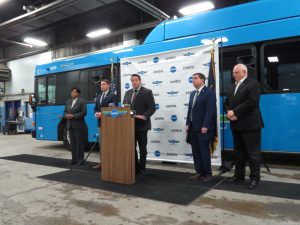ALBANY — The sweeping climate law that New York State passed in 2019 to reduce greenhouse-gas emissions through bans, regulations, and taxes is “deeply flawed” and needs the state legislature to reassert its authority over climate policymaking to avoid “costly and economically destructive mistakes.” That’s according to a recent report from the Empire Center for […]
Already an Subcriber? Log in
Get Instant Access to This Article
Become a Central New York Business Journal subscriber and get immediate access to all of our subscriber-only content and much more.
- Critical Central New York business news and analysis updated daily.
- Immediate access to all subscriber-only content on our website.
- Get a year's worth of the Print Edition of The Central New York Business Journal.
- Special Feature Publications such as the Book of Lists and Revitalize Greater Binghamton, Mohawk Valley, and Syracuse Magazines
Click here to purchase a paywall bypass link for this article.
 ALBANY — The sweeping climate law that New York State passed in 2019 to reduce greenhouse-gas emissions through bans, regulations, and taxes is “deeply flawed” and needs the state legislature to reassert its authority over climate policymaking to avoid “costly and economically destructive mistakes.” That’s according to a recent report from the Empire Center for Public Policy.
In the report, called “Green Guardrails: Guiding New York’s Drive to Lower Emissions,” Ken Girardin, the Empire Center’s director of research, analyzes the Climate Leadership and Community Protection Act (CLCPA) that the state passed about five years ago and makes recommendations for changes.
Girardin says that the CLCPA — which mandates an electric grid that uses only “zero emission” technology by 2040 and an economy that has effectively zero emissions by 2050 — “leaves the bulk of the decisions about how emissions will be reduced to state agencies under direct control of the governor, vesting them with policymaking powers that are supposed to be reserved for New York’s senators and assemblymembers.”
ALBANY — The sweeping climate law that New York State passed in 2019 to reduce greenhouse-gas emissions through bans, regulations, and taxes is “deeply flawed” and needs the state legislature to reassert its authority over climate policymaking to avoid “costly and economically destructive mistakes.” That’s according to a recent report from the Empire Center for Public Policy.
In the report, called “Green Guardrails: Guiding New York’s Drive to Lower Emissions,” Ken Girardin, the Empire Center’s director of research, analyzes the Climate Leadership and Community Protection Act (CLCPA) that the state passed about five years ago and makes recommendations for changes.
Girardin says that the CLCPA — which mandates an electric grid that uses only “zero emission” technology by 2040 and an economy that has effectively zero emissions by 2050 — “leaves the bulk of the decisions about how emissions will be reduced to state agencies under direct control of the governor, vesting them with policymaking powers that are supposed to be reserved for New York’s senators and assemblymembers.”




